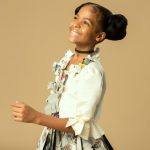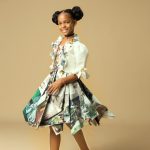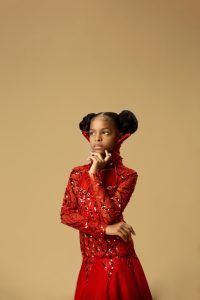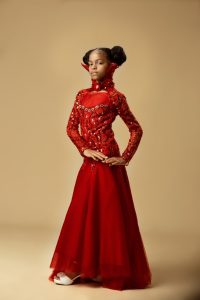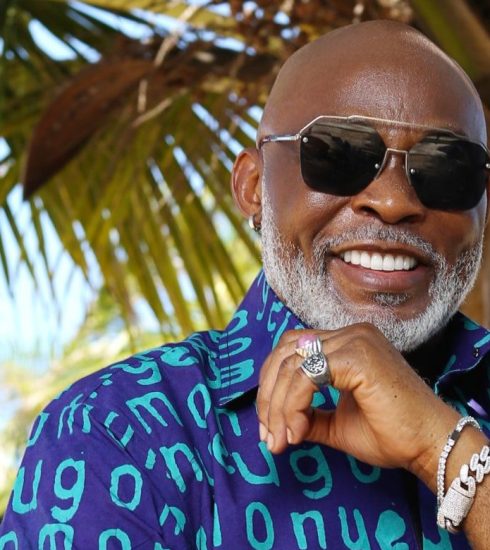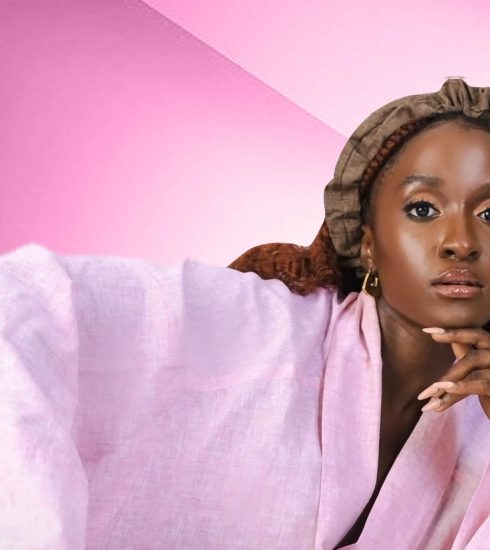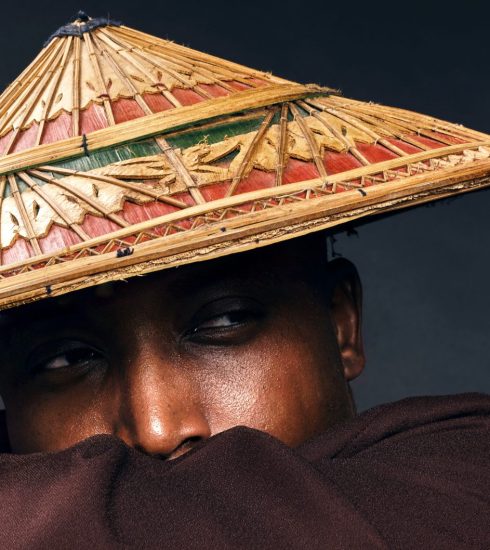June Alaare Wisse: Fighting Child Abuse Through Poetry
When we talk about children, the focus is usually on their future in glowing terms. Words like: ‘You can be the president,’ ‘you can shine brighter than a star,’ ‘you can be whatever you want to be,’ are things we often say to them with all indications pointing at the future. But what do you say to an eight-year-old girl who is already a superstar? For June Alaare Wisse, the options are limitless. Having bagged multiple awards and recognitions, including Little Miss United Nations Nigeria 2021, there is no limit to what June can go on to achieve. The whiz kid chats with DOWNTOWN’s Kehindé Fagbule to discuss life as a kid sensation.
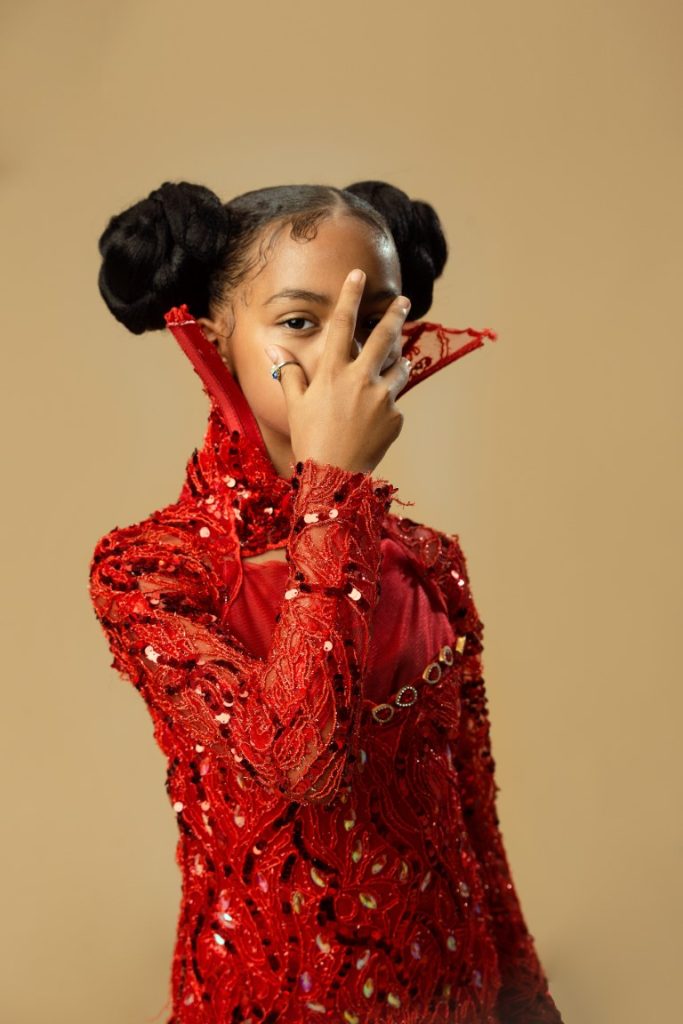
For so long, career talks for kids have sounded heavily corporate and white-collared. Most children, courtesy of their parents, only know to follow professional career paths and aspire to become medical doctors, lawyers, engineers, accountants, and so on; modelling as a career is not a popular pick. Even though modelling is her reality today, June realises that her future could look very different. Usually, when children are asked what they would like to be when they are grown, they answer with a level of assertion that is admirable. June thinks about that question differently. Her answer to what she wants to be when she grows older is very far from the generic response. “No, I haven’t thought about what I want to be in the future because of my mind of imagination. I want to be a pilot. I want to be a doctor. I want to be something when I grow up. When you don’t have a job, you end up living on the street and don’t have any money. But if you do have a job, you’d have a house, and you’d have kids if you’re married,” she said vividly.
Born in Ghana, Nigerian-Dutch model and spoken word artist, June Alaare Wisse, began her journey to stardom at the tender age of three when she started posing for pictures. While we spoke, the saying: You cannot buy experience, came to mind as she talked about her early modelling days. “Yes. At that time, I was a baby, and I kept putting my hand on my waist and doing the peace sign. Also, I used to have my tongue out a lot,” she says as she describes what would be the beginning of her modelling career. But June is not only a model; she is also a brand ambassador and a poet.
June plays with words in the form of poetry. She speaks about life as a poet. “It’s been great. I started writing at age seven and I’ve written six poems so far. I have recited my own personal poems before with some assistance from my mum—I write a little bit of it and just recite most of it. Also, I’ve recited a poem that was actually by Armanda Gorman and a speech by Mr Joe Biden. I also do mimicking. I feel really calm and relaxed like when I recited the poem on the girl child at the Miss Nigeria pageantry. There are always invisible commas in poems, which gets me really calm. I sometimes get really stressed and I just grab a book and read. Or sometimes I just go on my tablet,” she described how reading poems make her feel. But was it just something she picked up? Why did an eight-year-old, going on nine decide to delve into spoken words? What does she write about? “My poems are mostly about child and women abuse. Whenever I listen to the radio on my way home back from school, they would talk about these things. I would also see kids on the road begging for food or just sleeping on the streets and that inspired me to start reciting poems.” Child abuse is a topic that June understands through observation. She revealed how she drew keen interest in the subject matter, “it is mostly from listening to the radio. For example, I have heard stories of kids being raped and tortured. I think about how difficult it must have been for them and their parents. That inspired me to talk about it because so many people are silent about it, and the abuse goes on and on. For me, it is to create awareness of the fact that it is not a good thing.”
But June is not just talking about it; she is also involved—in her own little ways— in tackling some child issues. Having the privilege of a good education and a quality life courtesy of her parents, she has learnt to be grateful and pay it forward through charity. “Yes, I have done charity work. There’s a community in my neighbourhood that I donate food items and school materials to. I’ve also done an ‘SDG (Sustainable Development Goals) 1: No Poverty,’” she said.
June’s modelling career blossomed as she hugged the spotlight deservedly after being crowned the ‘Little Miss United Nations, Nigeria.’ She talked about preparations for the pageantry, “I had to study a lot. Lots of courses.” What kind of courses could kid pageants possibly be studying one might ask? “Some were about SDGs. Some were on ‘effective communication.’ I studied a lot. I had to focus, sometimes stay up and rehearse my courses with my mum. I couldn’t play until I got back from Abuja.” A quick check into what she was feeling throughout the pageantry on her journey to the crown shows that she wasn’t nervous at all. She relived the moment. “I was really confident. I didn’t have any stage fright or anxiety. I wasn’t thinking negative, I was only thinking positively, and in the end, I was like ‘who are they going to crown?’ And then they called a contestant, and I was like, ‘is she going to win?’ But I won because we had a conference and all of us talked about our SDGs and what we did. I talked about the way I went to a community behind our house to give them some food, supplies and school items. She became the ambassador.”
June enjoys what she does. Being a model, she loves and owns the spotlight, it’s easy with the oomph she possesses. But what could a challenging day on the job possibly look like? “Whenever I get booked on days that I have school. Because then we have to decide if I should go for the shoot and record an absent day in school, that is quite difficult. That is one of the hardest parts for me,” she said. And what could this eight-year-old like about her job? “The part I enjoy is when it’s like a toy or clothing item I have to model. If it is clothing then yes, I am wearing them. If it’s a toy, then I want to buy it. But if it’s not a toy, I’m still okay with that. I’m just going to model for them. The fun part is when I meet other people,” she said, highlighting her extroverted nature.
Her impressive modelling career secured her a brand ambassadorship with internationally acclaimed hair extension brand, Lush Hair. And in the build-up to this year’s Africa Magic Viewers Choice Awards, June Wisse had the runway to herself in a special Lush Hair fashion walk also featuring popular media sensation, Denrele Edun, and musician, Yemi Alade. Of course, June stole the spotlight—she did a full split halfway through her walk. She narrated the night, “it was great, it was an honour to be there. When I walked the runway, I waited till the other model had left, so I could have the stage all to myself and do something fabulous for Lush Hair.” She continues, “The split was not rehearsed at all. When the other model was on the runway, I thought about what to do, and when I started walking on stage, I knew that I had to do a split. Even though it wasn’t perfect, the crowd was wowed. I didn’t even notice that I did a professional split until I saw the reaction on people’s faces after leaving the stage. Backstage, I was screaming, ‘I did a split, I did a split, I’m a professional!’ People kept telling me I did a great job. Some of the models were even congratulating me. I told them it was my first time doing a professional split.” Her mum interjected, “you have done it before.” “I have done it before, but I failed horribly. I could never do a professional split, but I actually did it when I was on the stage. I was so proud of myself, knowing that my mother was watching, and she was proud of me too. Shout out to mum,” she said, stretching a thumbs up to her mother.
Although most children have inexplicably high energy to do many things, many don’t get permission to exert it. “I’m always vibrant. My mum says, ‘you talk too much!’ but some people think that’s okay.” We talked about school; how is she perceived by her friends? Do they know just how popular she is? She explains, “None of them is actually jealous of me because some don’t know. Tamar (one of her friends) knows about it, though, and she wishes she was like me.” That’s a typical response. Even for grownups, the feeling of envy is human nature. The result could either be a motivation to be better or grow into jealousy, depending on how it is handled; this is what makes or mars any relationship, so it must be managed carefully. June possesses the required wisdom. When asked what she says to her friend who wishes to be like her, she responded, “I told her she shouldn’t panic or think that she wouldn’t be able to get to my level. I also told her that she would be able to get there someday and shine like a star. That’s what I’m basically trying to do.” She then speaks about the sun, and I couldn’t help but wonder if she was admiring its brightness or hoping to shine that bright someday. “But the biggest star in the whole world is the sun because it is super big and bigger than all the stars,” she concluded.
Curious to know what a school day for an eightyear- old is like these days, the conversation tipped in that direction, so she gave an overview of her school experience. “Going to school, I do my work; sometimes, it’s a short lesson like 10 questions, then I do that. We do our work mostly on our tablets on a Dutch app that we learn on. Sometimes we have exams on the app as well. We also have a tradition since we’re a Dutch school, some days we basically don’t do work for the whole day. I think that is really fun. We have different places we would go to get popcorn and ice cream, swim, and go on the bouncing castle, which kind of burnt my heels. School has been really fun, I love my school. I had all my siblings in that school before, but they all graduated, so I’m alone now.” When asked what part of school she looks forward to the most, she flexed her refreshing sense of humour, “the part where I get to go home.” She continued, “it’s the best part. The second best part is when we get to eat food. Everyone in my school looks forward to it, it’s usually after art class. When I’m sitting at my table doing my art, I immediately hear my friends saying, ‘I can’t wait for art to finish and for lunchtime.’ Basically, the first thing my friends say whenever it’s playtime is, ‘I’m hungry’. They want chicken, they want food, and that’s so funny for me because, in my head, I’m dying of laughter.”
But her life at school isn’t just fun all day, of course. She gets down to the main reason for school, and so we talked about her favourite subject. “My favourite subject is math.” Although she admitted to hating math, she revealed that it is the subject that she excels in the most. She siad, “to be honest, every other subject I kind of fluke, but with math, I’m a bit good at it. I like addition, subtraction and multiplication. I’m very good at multiplication.” June’s interests are most kids’ interests. She loves doing things like swimming, ballet dancing, and playing the piano. She watches television too. “Let’s move on…” She said dramatically when asked what her favourite thing to watch on the TV was. She would reveal in a whisper, “I don’t want people to know. Animé.” It is a guilty pleasure of hers for sure; you’d see it on her face as she tried to decide if the world thinks animé—a Japanese television animation—is cool or not. As soon as she could sense a greenlight that animé is, in fact, cool, she said enthusiastically, “Oh my God. Thank you so much! I shall gladly answer if you have any questions regarding me and my obsession with animé.” She continues to speak, and gets even more excited. “I have some friends in school that are like ‘animé is boring’, and I get so mad at them. But I have a friend who knows animé. Almost every day, we go to each other and do animé improvisations. It is beautiful, and we love it so much. When she tells me stuff in Japanese, I scream,” she says passionately.
June learned Japanese from watching animé. Although not so fluent in it, she has been able to pick pieces of the language to make basic conversations. “You can watch dubbed animé in English, but when it’s in Japanese, their voices are so good. When it’s in English, their voices suck.” In addition to Japanese, June—whose articulation of the English language is at the native proficiency level—also speaks fluent Dutch. She took credit for her fluency, even though her dad is Dutch. She explained, “I speak Dutch. I learnt it myself. My father is Dutch, so maybe I have a blood connection or something; I don’t really know. When I joined my school, in Group 1-2-3, I couldn’t speak any Dutch. I used to cry when my auntie would drop me off. Then I started listening to people and what they would say, and I was taking notes in my brain, you know. The paper-pen brain, then you just write down everything they are saying. I just learnt Dutch like that.” She also speaks and understands a little bit of French, thanks to her mum’s fluency in the language. “I’m not that good at French, but I can say Bonjour. I’m sorry, French people,” she said. As far as local Nigerian dialects go, Pidgin English is the best June can do. “Wetin you want to chop now? My mum teaches me pidgin,” the Ghana-born said, laughing.
With a large following on Instagram, June’s digital presence is very impressive. But her mum, Wendie Kendabie Wisse, wouldn’t allow her access to social media. When asked if she ever goes on social media, she responded, “Nope. My mum handles my page. I only go on social media for my Instagram account to look at it. I don’t go on any other Instagram account. Sometimes I have to like posts of myself. Children aren’t allowed on Instagram. This is why my mum manages my account instead of me. She does many things for me.”
Her mother ensures that she stays grounded. But she has also created an enabling and expressive environment that ensures her daughter has fun and learns through childhood. June narrates what an average non-school day looks like. “When I wake up, I get vertigo; it is when you feel really dizzy, and then you have to lie in your bed for like an hour. But the worst vertigo is when you can’t even get up, and when you do, you feel like the hole inside your world is spinning around you. My vertigo is only when I get dizzy and go back to bed. If I don’t have anything to do on Saturdays, then I do not bathe early. I brush my teeth and eventually take a bath after my mum insists. After bathing, I have my breakfast. And basically, after my breakfast, I just ask mum for TV or go upstairs and simply watch my tablet.” What else do you enjoy doing? “I enjoy sleeping in my bed, lying down. I enjoy trying to go on my sister’s back. She runs away and says, “June, no, no!” But I keep on jumping on top of her. I also enjoy hugging my mum and snuggling up with her,” she said. You could say she works hard and plays harder.
To celebrate Children’s day, June shared some words for fellow kids. She said compassionately, “Children are the most vulnerable humans and depend on adults to provide their basic needs. They are unique, special and beautiful. And if their parents notice talent in them, they should support them. For example, my parents support me, especially my mum, who supports me greatly. To other kids, I would like to say that you are unique, you are special, and if you have a talent or a dream, go for it—tell your parents, and if your parents can’t help you, tell your siblings, and if they can’t, then talk to God; or me.”
It looks like we have a little Miss Congeniality. Perharps in the future, she might also include life coaching to her list of career choices.
Self-identifies as a middle child between millennials and the gen Z, began writing as a 14 year-old. Born and raised in Lagos where he would go on to obtain a degree in the University of Lagos, he mainly draws inspiration from societal issues and the ills within. His "live and let live" mantra shapes his thought process as he writes about lifestyle from a place of empathy and emotional intelligence. When he is not writing, he is very invested in football and sociopolitical commentary on social media.




